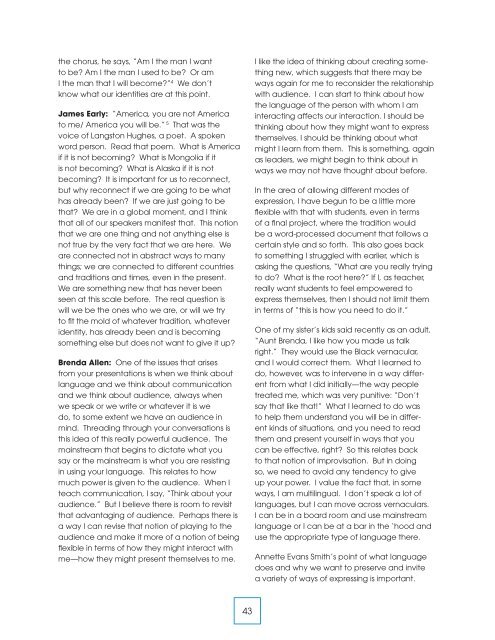The New Face of Arts Leadership in the West - westaf - The Western ...
The New Face of Arts Leadership in the West - westaf - The Western ...
The New Face of Arts Leadership in the West - westaf - The Western ...
Create successful ePaper yourself
Turn your PDF publications into a flip-book with our unique Google optimized e-Paper software.
<strong>the</strong> chorus, he says, “Am I <strong>the</strong> man I want<br />
to be? Am I <strong>the</strong> man I used to be? Or am<br />
I <strong>the</strong> man that I will become?” 4 We don’t<br />
know what our identities are at this po<strong>in</strong>t.<br />
James Early: “America, you are not America<br />
to me/ America you will be.” 5 That was <strong>the</strong><br />
voice <strong>of</strong> Langston Hughes, a poet. A spoken<br />
word person. Read that poem. What is America<br />
if it is not becom<strong>in</strong>g? What is Mongolia if it<br />
is not becom<strong>in</strong>g? What is Alaska if it is not<br />
becom<strong>in</strong>g? It is important for us to reconnect,<br />
but why reconnect if we are go<strong>in</strong>g to be what<br />
has already been? If we are just go<strong>in</strong>g to be<br />
that? We are <strong>in</strong> a global moment, and I th<strong>in</strong>k<br />
that all <strong>of</strong> our speakers manifest that. This notion<br />
that we are one th<strong>in</strong>g and not anyth<strong>in</strong>g else is<br />
not true by <strong>the</strong> very fact that we are here. We<br />
are connected not <strong>in</strong> abstract ways to many<br />
th<strong>in</strong>gs; we are connected to different countries<br />
and traditions and times, even <strong>in</strong> <strong>the</strong> present.<br />
We are someth<strong>in</strong>g new that has never been<br />
seen at this scale before. <strong>The</strong> real question is<br />
will we be <strong>the</strong> ones who we are, or will we try<br />
to fit <strong>the</strong> mold <strong>of</strong> whatever tradition, whatever<br />
identity, has already been and is becom<strong>in</strong>g<br />
someth<strong>in</strong>g else but does not want to give it up?<br />
Brenda Allen: One <strong>of</strong> <strong>the</strong> issues that arises<br />
from your presentations is when we th<strong>in</strong>k about<br />
language and we th<strong>in</strong>k about communication<br />
and we th<strong>in</strong>k about audience, always when<br />
we speak or we write or whatever it is we<br />
do, to some extent we have an audience <strong>in</strong><br />
m<strong>in</strong>d. Thread<strong>in</strong>g through your conversations is<br />
this idea <strong>of</strong> this really powerful audience. <strong>The</strong><br />
ma<strong>in</strong>stream that beg<strong>in</strong>s to dictate what you<br />
say or <strong>the</strong> ma<strong>in</strong>stream is what you are resist<strong>in</strong>g<br />
<strong>in</strong> us<strong>in</strong>g your language. This relates to how<br />
much power is given to <strong>the</strong> audience. When I<br />
teach communication, I say, “Th<strong>in</strong>k about your<br />
audience.” But I believe <strong>the</strong>re is room to revisit<br />
that advantag<strong>in</strong>g <strong>of</strong> audience. Perhaps <strong>the</strong>re is<br />
a way I can revise that notion <strong>of</strong> play<strong>in</strong>g to <strong>the</strong><br />
audience and make it more <strong>of</strong> a notion <strong>of</strong> be<strong>in</strong>g<br />
flexible <strong>in</strong> terms <strong>of</strong> how <strong>the</strong>y might <strong>in</strong>teract with<br />
me—how <strong>the</strong>y might present <strong>the</strong>mselves to me.<br />
I like <strong>the</strong> idea <strong>of</strong> th<strong>in</strong>k<strong>in</strong>g about creat<strong>in</strong>g someth<strong>in</strong>g<br />
new, which suggests that <strong>the</strong>re may be<br />
ways aga<strong>in</strong> for me to reconsider <strong>the</strong> relationship<br />
with audience. I can start to th<strong>in</strong>k about how<br />
<strong>the</strong> language <strong>of</strong> <strong>the</strong> person with whom I am<br />
<strong>in</strong>teract<strong>in</strong>g affects our <strong>in</strong>teraction. I should be<br />
th<strong>in</strong>k<strong>in</strong>g about how <strong>the</strong>y might want to express<br />
<strong>the</strong>mselves. I should be th<strong>in</strong>k<strong>in</strong>g about what<br />
might I learn from <strong>the</strong>m. This is someth<strong>in</strong>g, aga<strong>in</strong><br />
as leaders, we might beg<strong>in</strong> to th<strong>in</strong>k about <strong>in</strong><br />
ways we may not have thought about before.<br />
In <strong>the</strong> area <strong>of</strong> allow<strong>in</strong>g different modes <strong>of</strong><br />
expression, I have begun to be a little more<br />
flexible with that with students, even <strong>in</strong> terms<br />
<strong>of</strong> a f<strong>in</strong>al project, where <strong>the</strong> tradition would<br />
be a word-processed document that follows a<br />
certa<strong>in</strong> style and so forth. This also goes back<br />
to someth<strong>in</strong>g I struggled with earlier, which is<br />
ask<strong>in</strong>g <strong>the</strong> questions, “What are you really try<strong>in</strong>g<br />
to do? What is <strong>the</strong> root here?” If I, as teacher,<br />
really want students to feel empowered to<br />
express <strong>the</strong>mselves, <strong>the</strong>n I should not limit <strong>the</strong>m<br />
<strong>in</strong> terms <strong>of</strong> “this is how you need to do it.”<br />
One <strong>of</strong> my sister’s kids said recently as an adult,<br />
“Aunt Brenda, I like how you made us talk<br />
right.” <strong>The</strong>y would use <strong>the</strong> Black vernacular,<br />
and I would correct <strong>the</strong>m. What I learned to<br />
do, however, was to <strong>in</strong>tervene <strong>in</strong> a way different<br />
from what I did <strong>in</strong>itially—<strong>the</strong> way people<br />
treated me, which was very punitive: “Don’t<br />
say that like that!” What I learned to do was<br />
to help <strong>the</strong>m understand you will be <strong>in</strong> different<br />
k<strong>in</strong>ds <strong>of</strong> situations, and you need to read<br />
<strong>the</strong>m and present yourself <strong>in</strong> ways that you<br />
can be effective, right? So this relates back<br />
to that notion <strong>of</strong> improvisation. But <strong>in</strong> do<strong>in</strong>g<br />
so, we need to avoid any tendency to give<br />
up your power. I value <strong>the</strong> fact that, <strong>in</strong> some<br />
ways, I am multil<strong>in</strong>gual. I don’t speak a lot <strong>of</strong><br />
languages, but I can move across vernaculars.<br />
I can be <strong>in</strong> a board room and use ma<strong>in</strong>stream<br />
language or I can be at a bar <strong>in</strong> <strong>the</strong> ‘hood and<br />
use <strong>the</strong> appropriate type <strong>of</strong> language <strong>the</strong>re.<br />
Annette Evans Smith’s po<strong>in</strong>t <strong>of</strong> what language<br />
does and why we want to preserve and <strong>in</strong>vite<br />
a variety <strong>of</strong> ways <strong>of</strong> express<strong>in</strong>g is important.<br />
43


